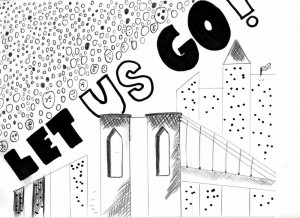Arrests justified by protecting citizens
Free speech is one of the most fundamental aspects of United States democracy, and the Occupy Wall Street protests throughout the streets of Manhattan’s Financial District the last two weeks are no exception. Though those who have participated have every right to do so and should be applauded for passionate civic engagement, they must expect law enforcement to step in when they are disrupting day-to-day activities and acting in a potentially dangerous manner.
Many protesters and their supporters were outraged after more than 700 protesters were arrested last Saturday for swarming the Brooklyn Bridge and blocking an entire lane of traffic for several hours. Seven hundred is undoubtedly a very high number of arrests and will draw attention, but the New York Police Department was justified in making the arrests for the sake of maintaining order and safety. It is just as undemocratic to interfere with other citizens’ lives with the exercise of free speech than it is to block such speech.
When people are breaking the law, they should not expect to be immune from any legal ramifications simply by citing the Constitution. That’s simply poor logic and a lack of foresight on the part of the protesters. Though police might have incited more rage against the government by arresting so many people, at the end of the day the police’s job is to maintain order and ensure safety. We should not fault them for doing their job in a civil manner.
A common misconception regarding the First Amendment is that any interruption of people’s exercise of free speech by the government is a gross violation of one of our most vital constitutional rights. Cases such as the Brooklyn Bridge debacle, however, demonstrate the presence and importance of reasonable time, place and manner.
The reasonable time, place and manner stipulation of the First Amendment allows the government to impose restrictions on the exercise of free speech as long as such regulations are “narrowly tailored to serve a significant government interest, and leave open ample alternative channels of communication.”
The Supreme Court has consistently upheld reasonable time, place and manner restrictions in First Amendment cases where public order and safety were at stake. One constantly cited restriction is the requirement that protesters at abortion clinics leave a buffer zone so as to allow clinic customers access to the driveway to the clinic (Madsen v. Women’s Health Center). If restrictions such as these can be placed on the exercise of free speech on a smaller scale, then why shouldn’t they be placed on larger-scale protests when they block nearly the entire Brooklyn Bridge?
Yes, 700 people is a very large number to arrest, but in such large groups more authority must be exerted to keep things from turning more chaotic. If that means making more arrests, then so be it.
By no means is telling people not to block traffic flow on major routes of transportation a violation of free speech. It is possible for one to speak his or her mind about what he or she believes and to be heard without inconveniencing and endangering others.
Sarah Cueva is a sophomore majoring in political science. Her point runs Fridays.


I am deeply disappointed by this piece and its confluence of ignorance and collusion with our oppressive police state. My dismay is heightened still more by the fact that it was written by someone majoring in political science.
Shame.
The video and witnesses make it clear. The police, both white shirts and blue shirts, led a group of marchers onto the roadway. At the halfway point that is at a point hundreds of feet above the east river protected from the waters by low vehicular guardrails the police leading the march turned and stopped. Arrests soon began. Question both the reasons for not blocking the roadway at the Manhattan foot of the bridge and for blocking the bridge at the halfway point. Daily Trojan be careful when you editorialize without the facts.
I am not disagreeing with you other than to say the facts are in question. That being said, to follow on with the authors discussion…. If you want to fully develop your argument you need to look at both sides. There were several thousand people attempting to march across the bridge. If the police wouldn’t have stopped in the middle of the bridge and takenSEVERAL hours to arrest and transport the 700 marchers, I would argue that the march would have been over in 2 or fewer hours. So how much public disruption was created by the marchers (who would have completed the march and dispersed) and how much was caused by the police stopping in the middle of the bridge and arresting 700 and transporting them from a RESTRICTED structure? I would say 1-2 hours for the march or the actual 5+ hours for the arrests… Which was a greater disruption (I won’t even go into the costs of 700 arrests, transportation to jail, tickets issued, paperwork submitted to the DA and of course the eventual lawsuits that are filed) and cost to the public?